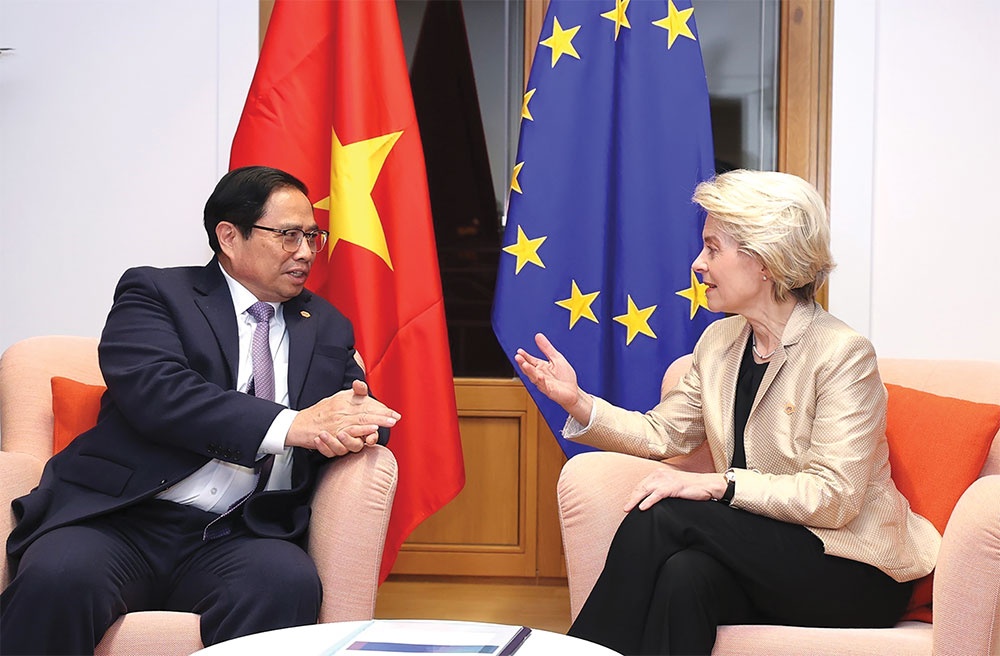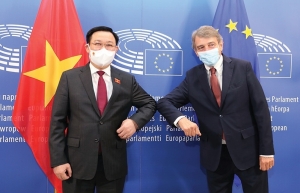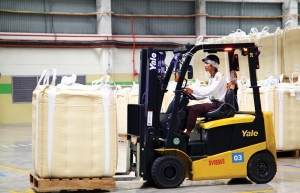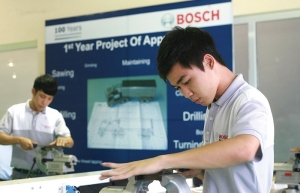European Union urged to pass EVIPA
On the sidelines of the ASEAN-EU Commemorative Summit last week, Prime Minister Pham Minh Chinh met with President of the European Commission Ursula von der Leyen, proposing that member states soon adopt the EU-Vietnam Investment Protection Agreement (EVIPA), which aims to protect investors and financing in both Vietnam and the EU markets and ensures that they will be accorded fair treatment.
“Vietnam wants to woo more EU funding, and the EVIPA will serve as a protector of investors’ rights and benefits, in addition to our improved business climate,” PM Chinh said.
 |
| Prime Minister Pham Minh Chinh met with President of the European Commission Ursula von der Leyen, VNA |
Leyen stressed that the EU “considers Vietnam one of the most important partners in the Indo-Pacific region as it is quite a dynamic and potential economy.” She affirmed that the EVIPA must be adopted soon to make it more favourable for both EU and Vietnamese investors to invest in their respective markets.
Earlier while speaking with his Belgian counterpart Alexander De Croo, PM Chinh also proposed that Belgium soon ratify the EVIPA, and Vietnam encouraged Belgian companies to invest in its territory in the sectors of digital transformation, renewable energy, logistics, seaport, and infrastructure. PM Croo said Belgium will discuss and adopt the EVIPA soon so that Belgian investors will be able to find it easier to pump money into Vietnam.
Statistics from Vietnam’s Ministry of Planning and Investment (MPI) showed that as of November 20, Belgium had 82 valid projects in Vietnam registered at $1.1 billion.
Vietnam’s Hateco Group and its Belgian partners, Dredging International NV and Rent A Port Company, last week signed an MoU on cooperation in developing a port and logistics service hub under Vietnam’s seaport planning and laws. Also last week, while meeting with Fernand Etgen, President of the Chamber of Deputies of Luxembourg, the Vietnamese leader asked the Luxembourg Parliament, which has already signed off on the EVIPA, to push for ratification by other EU members.
He also asked Luxembourg to support Vietnam in constructing an international financial centre, and implementing digital transformation, green transition, climate change response, and development of finance and banking as well as logistics.
On the wide-ranging trip, PM Chinh also met with President of the Dutch Senate Anthonie Bruijn and Speaker of the Dutch House of Representatives Vera Bergkamp. He suggested that the Netherlands soon approve the EVIPA in a bid to facilitate investment in Vietnam, where he called on the Dutch to place money into digital transformation, green transition, logistics, seaports, shipbuilding, food security, energy security, and climate change response.
Dutch Prime Minister Mark Rutte said his country supports the approval of the EVIPA, and that both nations need to effectively implement the EU-Vietnam Free Trade Agreement, which took effect in August 2021.
“The agreement now serves as an important driver for both nations’ economic and trade ties. Dutch companies are showing growing interest in Vietnam,” Rutte said.
In an example, Heineken has been successfully operating a joint venture with Saigon Trading Group over the past 30 years in Vietnam. To date, Heineken has invested $1 billion here. “Heineken plans to expand the operation with an extra $500 million in the next 10 years,” said CEO Dolf van den Brink.
In another case, CEO Evert Lichtenbelt and Rosanne van Miltenburg, regional business director of Harvest Waste B.V., said the Dutch waste management firm is conducting initial studies for a waste-to-energy project in Vietnam’s Mekong Delta province of Soc Trang, at an estimated $100 million. In August, Soc Trang authorities allowed a partnership between Harvest Waste and Vietnamese firms Pacific Group and Alpha Investment to study the project.
The Netherlands is now the biggest European investor in Vietnam, with 409 valid projects registered at $13.7 billion, according to the MPI.
Last week, PM Chinh also met with his counterparts from Italy, Portugal, and Poland, proposing their nations soon ratify the EVIPA.
Bernd Lange, chairman of the European Parliament’s Committee on International Trade, said more EU member states will adopt the EVIPA and the agreement will soon fully take effect, helping attract more EU groups into Vietnam. “During these globally complicated times, EU member states want to seek reliable and stable partners. I believe the approval process of the remaining nations will be sped up,” Lange said.
Currently, 12 out of 27 EU member states have adopted the agreement. Since last year, Vietnamese government members have been in constant contact with the remaining EU member states that have yet to ratify the EVIPA.
In phone talks in July between Vietnamese Minister of Foreign Affairs Bui Thanh Son and his Czech counterpart Jan Lipavsky, the latter noted as the rotating president of the EU Council for the second half of 2022, the Czech Republic will hasten EU member countries to soon approve the EVIPA.
Vietnam’s Ministry of Foreign Affairs’ (MoFA) is working with other EU member states on ratifying the EVIPA. Though signed in 2019 and ratified by the European Parliament and Vietnam’s National Assembly the following year, the EVIPA is still subject to EU member ratification procedures.
According to the MoFA’s Department of European Affairs, the remaining 15 countries – such as Germany, France, Italy, Belgium, and the Netherlands – have yet to do so due to various reasons such as the ongoing efforts being made to deal with the Russia-Ukraine conflict.
Barriers also include complicated procedures within these countries’ parliaments, with some parties not supporting trade liberalisation as they want to protect domestic production.
For example, in Belgium, the deal must be ratified by the nation’s six states independently. Germany and the Netherlands, meanwhile, already have bilateral IPAs with Vietnam that currently remain valid, making it more complex to approve the EVIPA.
“The EU hopes the EVIPA will boost funding in Vietnam, which is one of Asia’s fastest-growing economies and is also a gateway to the wider East Asia region. Vietnam is therefore a promising market, and relative to the size of its economy, it has attracted a very high rate of foreign investment,” said a statement from the European Parliament.
 | New investment nears via EVIPA sign-off The European Parliament is urging swift ratification of the EU-Vietnam Investment Protection Agreement by the EU member states’ parliaments, paving the way for larger waves of high-quality investment into the Southeast Asian market. |
 | European nations to embrace EVIPA-backed investments Vietnam is seeking further approval of the EU-Vietnam Investment Protection Agreement by member states of the EU, as the deal will protect the benefits of investors of both sides when performing in their respective territories. |
 | Vietnam ramps up ratification of EVIPA Despite Vietnam’s efforts to speed up ratification of the EU-Vietnam Investment Protection Agreement, some member states are being distracted by other massive issues, prolonging the time for investors from both sides to fully enjoy preferential incentives. |
| Modelled on the EU-Singapore Investment Protection Agreement, the EVIPA will replace the 20 existing bilateral agreements between Vietnam and 21 EU member states. The agreement includes a new investing court system, comprising a tribunal and appeal tribunal to resolve disputes between EU investors and Vietnamese authorities, and vice-versa. The system aims to offer a high level of protection for EU investors in Vietnam, ensuring that they are not targeted by abusive treatment disadvantaging them relative to Vietnamese operators, and that their assets are not expropriated without adequate compensation. At the same time, the agreement confirms the right of governments to “achieve legitimate policy objectives, such as the protection of public health, safety, the environment, or public morals”. The EU-Vietnam Free Trade Agreement (EVFTA) and EVIPA were initially negotiated as a single text, but in 2018 the EU and Vietnam decided to split them, following the approach chosen for the trade and investment agreements with Singapore. The EVFTA covers exclusive EU competences, and can therefore be ratified by the EU alone, without involving the member states. The EVIPA covers non-direct (portfolio) funding and investor-state dispute settlement mechanisms: these are shared competences, on which the EU shares decision-making powers with member states, meaning that the agreement must also be ratified by them.Source: European Parliament |
What the stars mean:
★ Poor ★ ★ Promising ★★★ Good ★★★★ Very good ★★★★★ Exceptional
Related Contents
Latest News
More News
- SK Innovation-led consortium wins $2.3 billion LNG project in Nghe An (February 25, 2026 | 07:56)
- THACO opens $70 million manufacturing complex in Danang (February 25, 2026 | 07:54)
- Phu Quoc International Airport expansion approved to meet rising demand (February 24, 2026 | 10:00)
- Bac Giang International Logistics Centre faces land clearance barrier (February 24, 2026 | 08:00)
- Bright prospects abound in European investment (February 19, 2026 | 20:27)
- Internal strengths attest to commitment to progress (February 19, 2026 | 20:13)
- Vietnam, New Zealand seek level-up in ties (February 19, 2026 | 18:06)
- Untapped potential in relations with Indonesia (February 19, 2026 | 17:56)
- German strengths match Vietnamese aspirations (February 19, 2026 | 17:40)
- Kim Long Motor and AOJ Suzhou enter strategic partnership (February 16, 2026 | 13:27)

 Tag:
Tag:



















 Mobile Version
Mobile Version